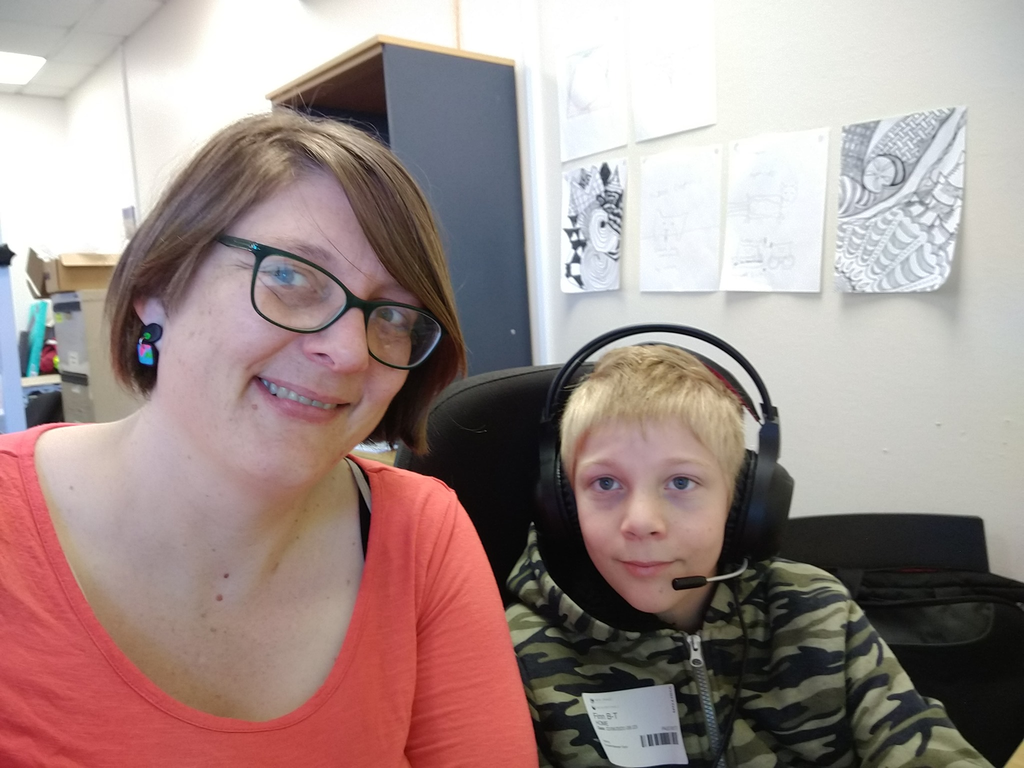
Her teenage son has autism along with inattentive ADHD, anxiety, and dysgraphia. Donnelle’s 10 year old boy also has autism and hyperactive ADHD while her daughter (also 10; they’re twins) has yet to receive a diagnosis.
“Once upon a time I had great plans of a fulfilling and financially secure career in software development. I loved the work: immersing myself in ‘the zone’ of manipulating mental models was immensely satisfying. My intellectual abilities were a core part of my self-image. I’m pretty sure I am also autistic.”
Donnelle attempted to return to full-time work when the twins were four months old, but says this was too much and she ‘crashed and burned’.
Eventually she found a part-time software development job, with the intent that her hours would increase as the twins settled into school.
“That never happened for various reasons, including my daughter’s daily before-school anxiety attacks, my son’s increasingly challenging behaviour, and then his diagnosis.”
“Then their father left. I found myself in the position of being a solo parent, grieving the loss of my marriage, supporting three grieving children, and trying to hold down my job, all while putting together the logistics required to keep working in a way that met the needs of my kids.”
“There were more and more calls from the school, and meetings, and appointments, as grief and confusion were expressed as anger and aggression.”
Like a lot of families, Donnelle says that although they have respite funding, they don’t have the family support to make use of it, and the allocation isn’t enough to cover costs for non-family. She adds that finding support staff is a difficult task in itself.
Gaps in the education system are also huge, from accessing funding to the resources to make inclusive education possible or even safe.
“MoE is broken. The system is broken.”
She has been very open with her colleagues about the challenges.
“It’s hard not to be when you’re getting the third ‘come pick him up’ call from school in a week – or you’ve been stuck at home for three months.”
“I am very fortunate that my workplace has been incredibly understanding and flexible. So long as I do my 26 hours, they don’t care when and where.”
The 2020 Covid-19 lockdown was a work-care logistical challenge.
“I found myself working nonstop from 6am to midnight, flipping between work, kids, housework, homeschooling, breaking up fights… I left one online meeting with ‘I have to go, he’s on the roof’. In another meeting I thought I was on mute when I exclaimed ‘where are your PANTS?!’ Spoiler alert: I was not on mute!”
When schools reopened her son found the adjustment hard, and he had no teacher aide support in the afternoons. Donnelle says MoE is trying to get more funding and support in place, but in the meantime the official advice is to take him out of school before he gets excluded. This is not an option for Donnelle.
“It is impossible to be an efficient, productive software developer in snippets of 15-30 minutes, so my work performance is suffering along with my mental health. I’ve considered leaving my job completely so I can home school him, but I am all too aware of how difficult that will be financially and mentally.”
She says some staff amongst the network of “fragmented, complex and inadequate” government agencies they’ve dealt with have been amazing, but there have also been negative encounters, such as dealing with a psychiatrist who refused to do a Conners ADHD assessment for her son, declaring that his issues were behavioural and due to Donnelle’s parenting.
There were also threats from agencies to remove the family from their books after missed appointments, when she received notification letters late or not at all.
“I’ve only just managed to pay my student loan off. I’m 40 and I’ve had that loan since I was 17. I don’t have a house or a full-time career.”
Donnelle finally stepped back in the office after working from home for three months after the Covid lockdown.
“As my work is halfway between my house and their father’s, my son has occasionally come into the office for an hour or two between handovers. He has a spot under my desk with a cushion and a Powerpoint for his device, and he likes to feed the fish.”
Donnelle says that her employer’s human resource team has been supportive through flexible work arrangements and has an Employee Assistance Programme (EAP).
“The manager and the CEO’s assistant are very understanding and keep people off my back. I work really hard to balance things as best I can, and people respect that.”